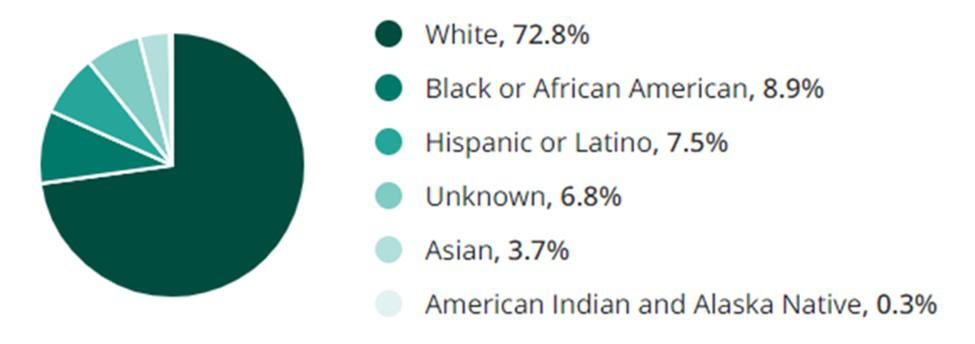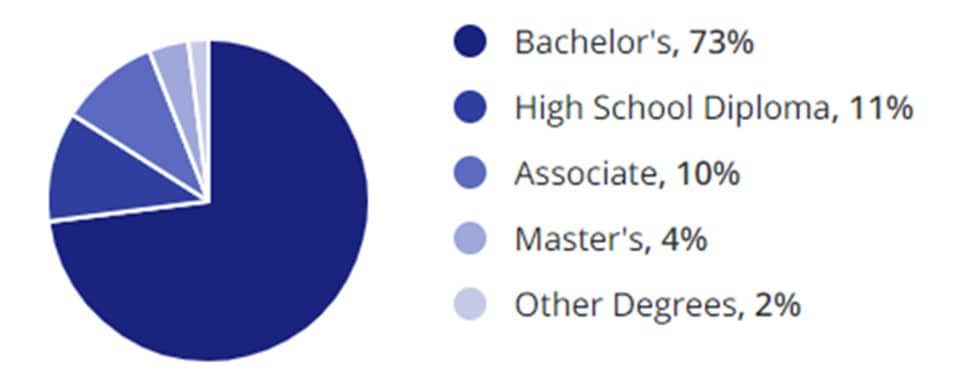Welcome to the ultimate guide for hurdling the challenges of sports jobs. Whether fresh out of college, pivoting in your career, or seeking to climb higher in the sports industry, this comprehensive guide is your ultimate resource. The sports domain is not just about fierce competition on the field; it’s a broad landscape booming with diverse opportunities that extend far beyond athletic performance.
In this guide, we delve into the essential educational paths that can lead to your dream job in sports, discuss the various areas of expertise within the industry, and break down the demographics to understand the representation across different segments. We also navigate salary and hiring trends to give you a clear picture of what to expect and how to prepare. This guide covers everything from exploring the in-demand skills to projecting the current and future outlook for sports jobs.
Furthermore, we address commonly asked questions and provide additional resources to help you forge ahead. Let’s embark on this journey together, exploring the boundless opportunities that await in the dynamic and exciting world of sports jobs!
Educational Requirements
A career in sports often begins with a solid educational foundation. A bachelor’s degree in physical education, sports science, or a related discipline is a good starting point for those interested in sports jobs. Higher academic qualifications, like master’s degrees, can open doors to more advanced positions and specialized fields, including sports analytics and writing jobs.
Certifications play a crucial role, too. Suppose you are aiming to enhance your qualifications. In that case, certifications from reputable organizations like the National Strength and Conditioning Association (NSCA) can significantly bolster your resume, especially for careers in coaching or athletic training.
Specialized education and training become even more critical for individuals eyeing niche areas within sports. For instance, careers in sports analytics or sports writing jobs might require additional courses or expertise in data analysis and journalism, respectively. Regardless of the specialization, continually upgrading your skills and knowledge through workshops, seminars, and relevant courses can keep you competitive in the dynamic sports industry.
Areas of Expertise
The realm of sports jobs is vast, encompassing a variety of roles that cater to different skills and interests. Whether you are inclined towards direct athletic engagement or prefer a role behind the scenes, there’s a place for you in the sports industry. Here are some critical areas of expertise:
Coaching and Scouting
Coaches and scouts are the backbone of any sports team, focusing on athlete development, team strategies, and talent identification. This path demands a deep understanding of the sport, excellent communication skills, and a knack for leadership.
Sports Medicine and Athletic Training
Specialists in sports medicine and athletic training play a crucial role in athletes’ health, safety, and peak performance. This requires a solid educational background in physical therapy, kinesiology, or related fields, plus certifications for hands-on roles.
Sports Analytics
With data-driven decision-making becoming increasingly important, sports analytics jobs are rising. Analyzing performance data to improve strategies and outcomes requires a blend of mathematical expertise and a profound understanding of the sport.
Sports Management and Administration
For those interested in the business side of sports, management and administration roles focus on operational aspects, financial planning, event management, and team logistics. Degrees in sports management or business administration are typically expected.
Sports Marketing and Public Relations
This area is ideal for those with a knack for storytelling and brand building. Sports marketing and PR positions involve promoting teams, managing fan engagement, and securing sponsorships. Creativity, communication, and strategic planning are essential skills here.
Exercise Physiology and Performance Analysis
Experts in exercise physiology and performance analysis work to optimize athlete training regimens and enhance performance through scientific principles. This specialization often requires advanced degrees in exercise science or physiology.
The sports industry offers a diverse array of career paths. Each area of expertise contributes to the success and vitality of sports teams and organizations and enriches the team of the sports community as a whole.
Demographics in the United States
Understanding the demographics of sports jobs in the United States sheds light on the diversity and representation of the industry. Here’s a closer look at the ethnicity, gender, and age distribution:
Ethnicity/Race:
The sports professionals sector showcases a need for more of a mix of ethnicities and races, reflecting society’s diversity. The breakdown is as follows:
- White: 72.8%
- Black or African American: 8.9%
- Hispanic or Latino: 7.5%
- Asian: 3.7%
- Unknown: 6.8%
- Native American and Alaska Native: 0.3%

Gender:
The gender spectrum in sports jobs shows promise toward achieving balance:
- Male: 61.6%
- Female: 38.4%
The industry looks to increase female representation, especially in roles traditionally dominated by males, such as coaching and sports analytics.

Age:
Sports careers attract a wide age range, from young emerging talents to experienced veterans:
- Average age of athletes: 28 years
- Average age of professionals (coaches, management, etc.): 40 years
This diversity in age ensures a blend of youthful energy and seasoned expertise, vital for the growth and sustainability of the sports industry.

Salary Trends
Salaries in sports jobs exhibit a wide range due to factors such as role, level of competition, sport type, and geographical location. Here’s a snapshot of what professionals in the sports industry might expect:
- Entry-level positions in sports administration and support roles often start from $30,000 annually.
- Mid-level professionals such as sports analysts, coaches, and marketing specialists can expect salaries ranging from $50,000 to $80,000, depending on the organization’s experience and size.
- Top-tier positions, including high-level management roles and professional athletes with substantial endorsements and contracts, can see salaries soaring into the millions.
It’s important to note that salary trends in sports jobs are also influenced by education level and specialized skills. For instance, professionals with expertise in sports analytics jobs may command higher salaries due to the specialized nature of their work and the growing importance of data-driven decision-making in sports.
Moreover, the sports industry, with its variabilities in seasonality and competition levels, means that salary trends can fluctuate. Staying on the same level as these trends and continually enhancing one’s skill set, such as diving deeper into sports analytics or writing, can significantly impact salary prospects.
Understanding salary trends’ intricacies is crucial for those exploring or advancing in the field. Resources like Showcasing Diversity in Your Resume: Tips and Tricks offer valuable insights into positioning oneself favorably within the job market, potentially affecting salary outcomes.
Hiring Trends
The sports industry demonstrates robustness and resilience, consistently demanding skilled professionals across various roles. Here are some key hiring trends shaping the landscape:
- Increasing Demand for Digital Skills: With the rise of online platforms, there’s a growing need for professionals skilled in digital marketing, social media, and sports analytics. These roles support fan engagement, strategic decision-making, and brand promotion.
- Focus on Diversity and Inclusion: Sports organizations are placing a higher emphasis on building diverse and inclusive teams. This includes efforts to hire from underrepresented groups and encouraging environments where everyone, regardless of background, can succeed.
- Wellness and Mental Health: The importance of athlete wellness and mental health has never been more recognized. This trend is driving demand for sports psychologists, nutritionists, and wellness coaches dedicated to supporting athletes’ overall well-being.
- Technological Advancements: Innovations in sports technology, such as performance monitoring devices and data analytics software, are creating new job opportunities. Specialists in these areas are increasingly sought after to provide teams with competitive edges.
These hiring trends reflect an industry evolving, ensuring its relevance and appeal to a broad audience. As such, sports professionals must adapt by acquiring new skills and staying informed about industry developments.
Understanding these trends can provide valuable insights for individuals eager to dive into the sports industry or navigate their career trajectories. Resources like Applying for Remote Jobs: Working Successfully from Anywhere in the world, although focused on remote work, offer broader advice that can be adapted to the sports industry, including how to leverage digital tools and embrace flexibility in work environments.
Education Levels
The education levels within the sports industry vary widely, reflecting the diverse range of roles and the different qualifications they require. Here’s a broad overview:
- High School Diploma or Equivalent: Some entry-level positions, particularly those focused on administrative support or essential operational roles, may only require a high school diploma or equivalent.
- Bachelor’s Degree: A majority of careers in sports, including coaching, sports management, and marketing, often require at least a bachelor’s degree in a related field such as physical education, sports science, sports management, or business.
- Master’s Degree or Higher: Advanced positions, especially those in sports analytics, research, and higher education (e.g., becoming a professor in sports-related studies), typically require a master’s degree or higher. Similarly, roles strongly emphasizing scientific research, like exercise physiology, might also demand advanced degrees.
- Certifications: Various roles may need specific certifications on top of formal education. For instance, athletic trainers and strength and conditioning coaches need to be certified by relevant professional bodies to practice.
Education is undeniably a cornerstone for aspiring sports professionals. Continuous learning and specialization can thus significantly impact one’s career progression in the sports industry. For instance, pursuing additional qualifications or certifications in burgeoning fields like sports analytics can elevate one’s prospects in highly competitive and specialized areas.

Skills in Demand
Specific skills are particularly in demand in the competitive world of sports jobs. Cultivating these abilities can significantly enhance your career prospects:
- Athleticism and Physical Fitness: For roles directly involved in sports, such as coaching or athletic training, maintaining a high level of physical fitness and demonstrating a profound understanding of athletic principles is crucial.
- Strategic Thinking: Whether planning a game strategy or managing a team, thinking critically and developing effective plans is invaluable.
- Leadership: Leadership qualities are essential, especially for roles in coaching, management, and administration. Inspiring and guiding teams toward success is crucial to many sports careers.
- Communication: Clear and effective written and verbal communication is vital across all sports areas. This includes conveying strategies, motivating teams, and engaging with fans and stakeholders.
- Digital Proficiency: With technology playing an increasingly significant role in sports, skills in digital marketing, social media management, and sports analytics are highly sought after.
- Teamwork: Sports are inherently team-oriented. The ability to work well with others and foster a supportive and collaborative environment are skills that cannot be overstated.
- Data Analysis: For those in sports analytics jobs, proficiency in data analysis tools and methodologies is essential for evaluating performance and making data-driven decisions.
Keeping up with these skills in demand and continuously developing them can set you apart in the sports job market. Moreover, showcasing these skills effectively, such as through your resume or during interviews, is just as important; this can enhance your chances of getting hired in the sports industry.
Current & Future Sports Jobs Outlook
The outlook for sports jobs remains optimistic, fueled by the industry’s resilience and the never-ending passion of athletes and fans. Here’s what the current and future landscape looks like:
- Growth and Expansion: The sports sector is expected to grow, with new opportunities arising from technological advancements, increased focus on health and fitness, and the expansion of sports leagues and events.
- Diverse Career Opportunities: Opportunities aren’t limited to traditional roles like coaching or playing. Careers in sports analytics, writing jobs, digital content creation, and wellness coaching are expanding, reflecting the industry’s evolving needs.
- Emphasis on Inclusivity: There is a concerted effort within the industry to improve diversity and inclusion. This shift aims to create more professional opportunities for underrepresented groups, enhancing the richness of perspectives and experiences in sports.
- Technology’s Role: As sports organizations increasingly rely on data analytics and digital platforms for fan engagement and performance analysis, the demand for professionals with digital skills is expected to rise significantly.
Considering these trends, the future for those pursuing sports jobs looks promising. However, success in this competitive field requires staying informed about industry developments, continuously upgrading skills, and adapting to change. By keeping an eye on the current trends and future outlook, aspiring sports professionals can better tread their career paths toward fulfilling and promising opportunities.
FAQ’s
What Degree Do I Need for a Career in Sports?
Most careers in sports typically require at least a bachelor’s degree in related fields such as sports management, physical education, kinesiology, or a similar discipline. For specialized roles, especially in sports analytics or research, a master’s degree or higher may be necessary.
Can I Work in Sports Without Being an Athlete?
Absolutely. The sports industry offers various non-athletic roles, including sports analytics, marketing, management, coaching, and sports medicine. Skills in digital media, business, and health can lead to fulfilling careers within the sports sector.
How Competitive Are Sports Jobs?
While the sports industry can be competitive, the growth in diverse opportunities and the expanding importance of inclusive roles means there are various paths to enter and succeed in the field. Focusing on niche skills like data analysis or digital marketing may enhance your job prospects.
Are Sports Jobs Well-paid?
Salaries in sports jobs can vary widely based on the role, experience, and location. While entry-level positions might offer modest pay, sports analytics, professional coaching, and executive management roles can be highly lucrative, especially with additional qualifications and experience.
How Can I Enhance My Employability in the Sports Industry?
Expanding your expertise through certifications, attending industry conferences, networking, and gaining hands-on experience through internships or volunteer work can significantly boost your employability. Focusing on in-demand skills like sports analytics or digital engagement strategies can make you more attractive to potential employers.
What is the Future Outlook for Sports Jobs?
The sports industry is set for growth, increasing opportunities in digital engagement, wellness, sports analytics, and inclusivity-focused positions. Staying abreast of technological advancements and societal trends can help align your career trajectory with the future demands of the sector.
Additional Resources
Starting a sports career is exciting and full of opportunities. To support your journey, we’ve compiled a list of additional resources that can offer guidance, education, and inspiration. These resources come from trusted organizations and institutions that are dedicated to fostering growth and success in the sports industry:
- NCAA’s Resources for Future Student-Athletes: An invaluable guide for aspiring college athletes, providing information on eligibility, recruitment, and balancing academics with athletics.
- Team USA Athlete Resources: A suite of resources for athletes pursuing excellence in their sports, including wellness, career transition programs, and anti-doping guidelines.
- National Academy of Sports Medicine (NASM): Offers certification programs and advanced education for fitness professionals, athletic trainers, and anyone interested in sports medicine and performance.
- American College of Sports Medicine (ACSM): A leading authority in sports medicine and exercise science, providing research, education, and practical applications in sports health and fitness.
These resources represent just a starting point. Whether you’re a student-athlete, a professional looking to shift careers into sports, or someone interested in the business and analytics side of the industry, you can always trust Diversity Employment for reputable sources to enhance your knowledge and skills. Continual learning and networking within your interest in sports will open doors to new opportunities and career pathways.
Conclusion
The journey into the sports industry is as thrilling as it is rewarding. The field offers a broad spectrum of opportunities for individuals across various levels of expertise and interests. Sports jobs provide opportunities for both on-the-field athleticism and behind-the-scenes management. With the proper education, skills development, and a keen eye on industry trends, achieving your dream position in the sports sector is well within reach.
The sports industry is evolving with diversity and inclusivity, making it an exciting time to be part of this field. Stay informed, continuing education, and networking are critical if you’re starting or looking to pivot your career into sports.
We encourage you to take the next step in your sports career journey by joining Diversity Employment. Here, you’ll find access to resources and numerous diversity and inclusion positions at truly diversity-focused companies. Upload your resume, explore job listings, and connect with employers looking for talented individuals like you!




